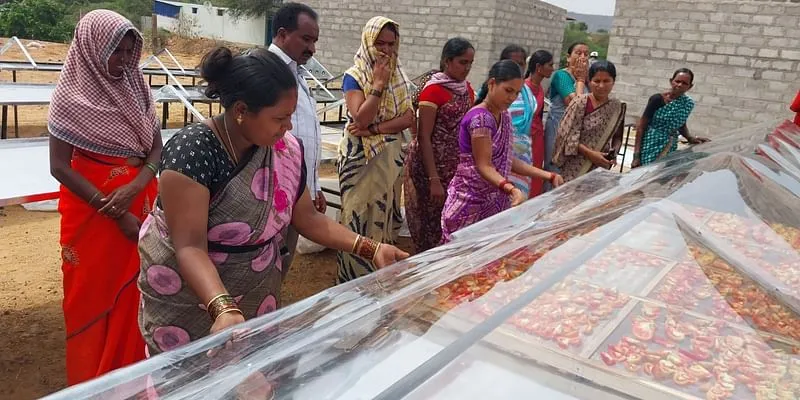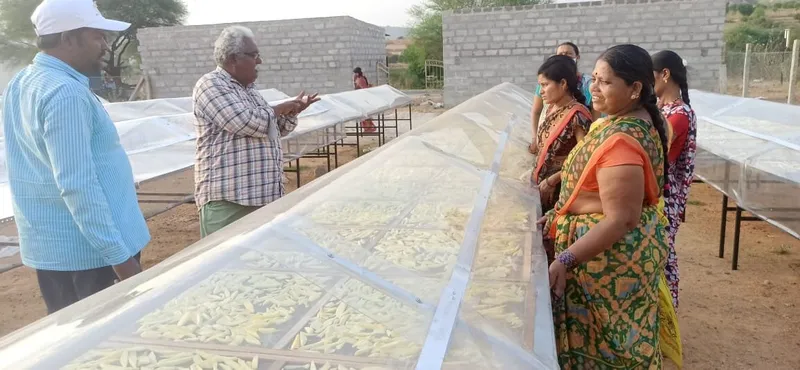Meet the 25-year-old entrepreneur helping farmers reduce waste using solar dryers
Founded in 2019, Raheja Solar Food Processing Pvt Ltd manufacturers affordable, locally-made solar dryers that help farmers create value-added products.
Depending on when you are reading this article, you could have paid anywhere from Rs 10 to Rs 100 for a kilo of tomatoes.
This wild swinging of market prices leaves farmers struggling to find adequate compensation for their work. Scenes of farmers dumping fresh produce on roads amid a price crash are commonplace across the country. Despite being a global agricultural powerhouse, every year around 30% - 40 % of total production in India ends up as waste at various levels of the supply chain.
One way to reduce food wastage is by drying fresh produce. According to Varun Raheja, Founder of Raheja Solar Food Processing Pvt Ltd, the global demand for dried produce is currently worth $70 billion.
Varun, a 25 year old entrepreneur from Indore, says the inspiration to launch the company came after he learnt sustainable living and practices at Jimmy McGilligan Centre for Sustainable Development, an NGO in Indore.
His interest in solving farmers’ woes led him to research solar dryers. A few years later, in 2019, he launched his own company.
“I am not a job person, I wanted to do something problem solving and what else can be meaningful other than supporting our ann data (farmers). I have seen farmers working at the mercy of buyers and also wasting their produce because of a fraught supply chain. Farmers anyway suffer capital scarcity and waste produce pile up to their problems and this is the area I thought something needs to be done,” Varun tells SMBStory.
A survey conducted by the Indira Gandhi Institute of Development Research revealed that farmers who had harvested some produce this season (in 2021), 29% were still holding on to it, 13% had sold the harvests at throwaway prices, and about 7% reported that they had to let the produce go to waste. The study was based on data from around 370 farmers across nine Indian states.

Women working on solar dryer by Raheja Solar Food Processing
The business model
The solar drying technology is an example of how freely available energy can be effectively used for the benefit of farmers.
One part of the equation is providing farmers with an affordable and DIY foldable solar dryer to create value-added products from the produce, for example, dried tomatoes, onion, ginger, mangoes, watermelon, rose petals, etc., which would otherwise be sold at very low prices or go to waste.
However, only solar dryers won’t help farmers since they don’t have market access. This is the second part of the equation where solves.
The company buys these dried products from the farmers to sell them to the end consumer.
“Our dryers empower farmers with a choice of selling their produce at their time and price. The farmers can preserve their excess produce or daily leftovers without losing its natural color, taste, fragrance, and nutrients,” Varun says, adding that products processed in the solar dryer can be stored for more than a year.
This extended life allows farmers to have some control despite fluctuation in market prices, as whenever the rates are high, they can sell their produce. “It makes farmers independent from the market rates and gives them the authority over traders. So whenever our associated farmers get high rates in the fresh market they sell it and if not they process it,” he adds.
The solar dryers are made locally as Varun says he has partnered with local vendors who manufacture different parts as per designs given by him. The price range of these dryers varies between Rs 10,000 for domestic uses and up to Rs 5 lakh for mid-sized and to date, the company has installed 1,600 solar dryers.
“All farmers cannot afford the solar dryers and hence we work with farmer groups where we deal with one big farmer of the community who in turn supports the other farmers. This way, we are working with 10,000 farmers and counting across India in 20 states,” Varun says.
Since its inception, Varun claims that the company has been able to reduce wastage of 250 MT of produce by farmers across India. The company also receives support from Villgro - one of India's pioneering incubators of social enterprises.

Solar dryer by Raheja Solar Food Processing
Going B2B
The company has set up two collection centres —one each in Indore and Vijayawada—to buy dried produce from the farmers.
“Post processing, we buy back the produce from farmers from the farm itself and bring it to our collection centre where we do sorting, quality check and packaging before supplying it to the end consumer. We do have partnership with more than 150 companies who regularly purchase our products,” he says.
Varun refrains from disclosing the names of the companies he is dealing with for dried products but says they are recognised brands of India.
“With our decentralised production model using slow dehydration at source itself, we are providing our end consumer highest quality products at reasonable prices and giving back a good margin to farmers. Our major products are dried fruits like dried mango, apple, banana, grapes and pineapple, dried flowers like rose petals, chamomile, hibiscus and blue pea, dried vegetables like dried tomato, ladyfinger, onion and garlic whereas many other dried herbs, spices and dried roots products also available,” Varun explains.
Market scenario and the way ahead
Varun declined to disclose revenue data but says he has built a multi-million turnover company in a span of three years of inception. Other players such as S4S Technologies dominate the market but Varun is optimistic that his business will grow since it focusses on educating the farmers.
“There are many companies who are making solar dryers but they are not educating farmers of the use die to which many farmers before bought the dryer but don’t know what to do with the end product and we bear the repercussions. We are trying to make farmers aware and see the positive changes slowly,” he says.
The demand for Raheja Solar’s dryers isn't restricted to India as Varun is now supplying to Indonesia, Bhutan, and Malawi. For the dried products, the company is still at its nascent stage but seeing the demand globally, Varun is on his way to expand to other countries.
Edited by Affirunisa Kankudti







